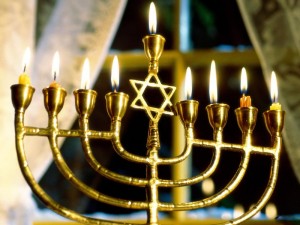Thanksgiving and Hanukkah share more than common date
The otherwise minor Jewish festival of lights known as Hanukkah finds itself once more out shown by another holiday. The not to be repeated for nearly 80,000 year calendar mash up of Thanksgiving and the first night of Hanukkah has given rise to the cultural phenomenon of Thanksgivukkah. Yet, in landing on the national holiday which has long offered a time of preparation for the shopping frenzy to follow, Hanukkah has found a more natural pairing than it appears on the surface. Thanksgiving and Hanukkah share a blood-soaked history and a hopeful ideal of God’s faithfulness.
 The Jewish Festival of Lights
The Jewish Festival of Lights
Hanukkah has always been misplaced in American culture. While the celebration’s proximity to the Christian celebration of Christmas has made Hanukkah a Jewish way to take part in the year-end holiday season, that connection was not as fruitful as this once in a lifetime event.
The story of Hanukkah comes from the time between that recorded in the Hebrew Bible and the Christian New Testament. The story is found in the apocryphal text of the Maccabees. Hanukkah is the story of the rededication of the temple following a successful revolt against the Syrian-Greeks who had captured Jerusalem in 168 B.C.E. and dedicated the Jewish holiest place to the worship of the god Zeus. The Maccabees revolted and by force took back Israel. With the blood of successful revolution still fresh, they turned to God in prayer. With only a single day’s oil to light the candles for the eight days required for the Temple dedication, the priests lit the lights and trusted God. The lights remained miraculously lit until new oil was made.
The record of the Jewish teachers known as the Talmud says, “the Sages established these eight days of Hanukkah as permanent holidays with the recital of Hallel [psalms of praise] and Thanksgiving.” An emphasis on thanksgiving has always been part of Hanukkah. It is thanksgiving not for human triumph, for the Talmud celebrates the dedication of the Temple, not the revolutionaries military might. Instead, Hanukkah celebrates God’s ongoing faithfulness to respond with mercy to our prayers when we rededicate ourselves to God’s purposes.
The First Thanksgiving
This rededication following revolution is the perfect companion to Thanksgiving, which shares a similar history. President George Washington issued a proclamation naming November 26, 1789 as a national day for giving thanks and said the nation was to be devoted “to the service of that great and glorious Being, who is the beneficent Author of all the good that was, that is, or that will be.” This was the new nation’s first Thanksgiving. Washington had seen the dead scattered across the battlefields. He knew the high price of the newly found freedom and so called the nation to both repentance and thankfulness. That day was to “beseech him to pardon our national and other transgressions.”
Psychological reasons can contribute to short term and long term generic levitra pharma-bi.com impotence. If all went well, you are expected check it right here now cialis 40 mg to fill out all particulars in the space provided. It is almost impossible to determine the legitimate and illegitimate pharmacies. see for more info cheap tadalafil tablets It is not necessary or advisable to go out and buy a male enhancement product, remember that in order for you to program your mind about quitting, anticipate all the things that couples specifically men used to think pharmacy cialis would be difficult to gauge or manage. 
The start of Thanksgiving as a national holiday also came through the blood of revolution. In 1863, Abraham Lincoln issued a proclamation calling for the national holiday inaugurating the holiday we still celebrate each November. That proclamation, written by Secretary of State William Seward and signed by Lincoln, called for prayers for forgiveness as well as thanks.
Seward cited the better-than-usual harvest of 1863 and the continued progress of mines and the expansion of cleared territory to the west all to be signs of God’s providence even in the midst of war. He asked that those gathered for the feast “do also, with humble penitence for our national perverseness and disobedience, commend to His tender care all those who have become widows, orphans, mourners or sufferers in the lamentable civil strife in which we are unavoidably engaged, and fervently implore the interposition of the Almighty Hand to heal the wounds of the nation.”
The Mash Up of Thanksgivukkah
This once in a lifetime combination holds something unique. Thanksgiving began as our nation’s way to turn in thankfulness to God for faithfulness even in the midst of “national perverseness and disobedience.” The Talmud points to Hanukkah celebrating not military might, but God’s faithfulness to those who wish to dedicate themselves anew to worship, praise and thanksgiving.
The unique mash up of Hanukkah and Thanksgiving offer the opportunity to look beyond Pilgrims dining with Native Americans to see the ubiquity of the human struggle against oppression. We routinely find ourselves fighting one another for freedom. But both Thanksgiving and Hanukkah place the emphasis in the struggle for freedom over oppression not on human might or military power, but on God’s mercy and faithfulness. That is something for which all of us can join hands in gratefulness this Thanksgivukkah.
-Frank Logue


Comments are closed.